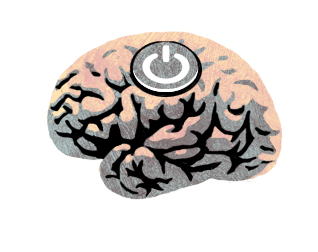Hatefully yours
23 December 2011 | Non-fiction, Tales of a journalist

Illustration: Joonas Väänänen
In the new media it’s easy for our pet hatreds to be introduced to anyone who is interested. And of course everyone is interested, how else could it be? Jyrki Lehtola investigates
Twitter, Facebook, Twitter, Twitter, Twitter, Facebook, Twitter, how can we get the revenue model to work by using our old media, Twitter, Facebook, Twitter, Twitter, hey, what about that revenue model of ours, Twitter.
The preceding is a poignant summary of what the Finnish media was like in 2011 when the rules of the game changed like they have changed every year. And we still don’t even fully understand what the game is supposed to be.
As late as 2010 you could still discuss the existence, significance and utility of Facebook as if there could be many different opinions on the subject; the defenders’ argument centred on social interaction and community, while the detractors was more ‘why would I join Facebook, I have a life.’
But in 2010 there was no longer any call for such wrangling, because Facebook was life. People didn’t join it anymore, because they already had. On Facebook we looked for cleaning help, shared our Spotify lists, shared links, endlessly, and told all of our friends how depressing Mondays are, or, as you would express it on Facebook: ‘Isn’t it great that it’s Monday again?’
We also hated there – oh, how we hated. Facebook tried to make us positive by offering us a ‘Like’ button, not a ‘Hate’ or ‘Despise’ button. But we were people who hated and despised – how to fulfil that important side of our nature on Facebook?
Easily, and, what’s more, in a pleasantly communal spirit; Facebook was a social medium, after all, not a medium that just tells us what to think, and what about. In the name of communality we created groups where we hated things and told others what to think.
We hated people who thought differently than we did, people whose values didn’t match our own, people who said ‘no’ when they were supposed to say ‘yes’ and people who worked in parts of the media that didn’t live up to our conception as social media actors about what people in the media should think.
Social media brought us a new communal gift: lurking. We created groups that hated and boycotted media, viewpoints and people, and then we sat and followed those same things, even though the purpose was to boycott them. Whenever the object of our hatred made a mistake, we linked to that error on Facebook, and then we laughed with our friends about how impossibly stupid people are.
Facebook was supposed to bring us a new, joyful sense of community, but even Mark Zuckerberg couldn’t do anything about our nature; we adopted Facebook in order to lure our friends into hating the things that we hated.
In 2011 Twitter also became an important part of our lives, because it understood our limitations and offered us the opportunity to condense our feelings and knowledge down to 140 characters. Twitter was the text messaging service for those who really wanted to subscribe to our social messages and hear that today we were ‘drunk in Porvoo’, that tomorrow ‘I’ll find out about a secret project I can’t talk about’ and that ‘here’s a link for all my Twitter followers to a page I found interesting’ because there can never be enough links in the world.
Twitter also gave us the opportunity to speak out in a way that didn’t require anything of ourselves. When you’re expressing your displeasure with a politician, the media or an international corporation in 140 characters, reasons don’t matter much, what you think does.
At the same time, Twitter gave the old media something to think about. What do we have to offer anyone anymore, and how can we squeeze money out of it? Because of Twitter, those of us in the old media were always late. Tweets were the first announcements of the revolutions in North Africa, the London riots and the death of Amy Winehouse.
We came limping along so late it was embarrassing. The subheading for every newspaper and TV news website could have been ‘News for the slow’.
The world became a place where you never had to wait for any information; everything was always available.
Whether we need all that information as quickly as we receive it is another matter. The new media was supposed to be social, but nothing had changed. There we sat, still alone in front of the television, just with the addition of our iPads, where we constantly received new information about what was happening in the world outside of the television; and, instead of digesting that information, we did what we always do nowadays: we forwarded it on.
It isn’t very long since we descended from the trees, and our gait is still a little unsteady. Our brains have been forced to adapt little by little to an accelerating world. Now that world has become so fast and so manic that our brains can’t necessarily keep up anymore. You can read about the effects of that imbalance in the old media, where the number of news blurbs about disorderly conduct has been rising sharply.
Translated by Owen Witesman
No comments for this entry yet
